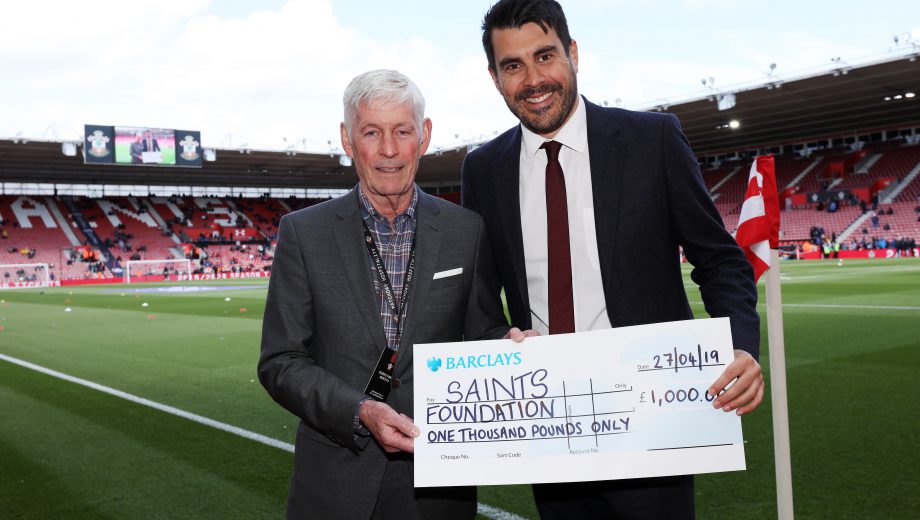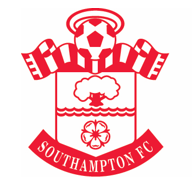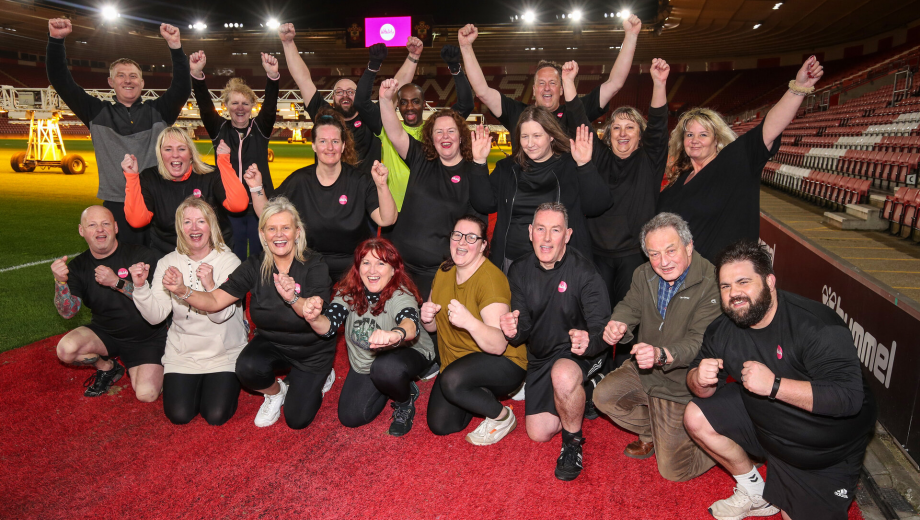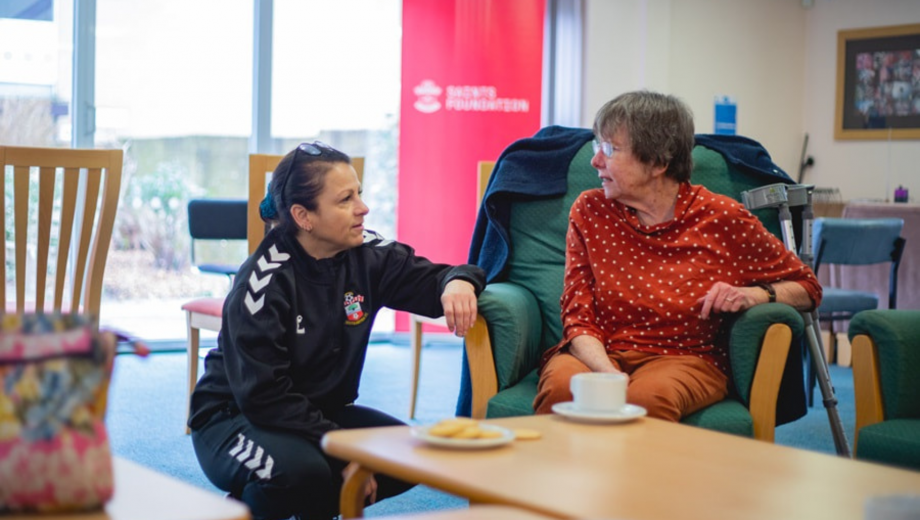EFDN Interview- Greg Baker from Saints Foundation
The next EFDN Interview features Greg Baker who is Head of Saints Foundation, the charity of Southampton Football Club.
Greg Baker is Head of Saints Foundation, the charity of Southampton Football Club, who play in the English Premier League. Alongside his role with Saints Foundation, Greg also does some additional work for the club, looking after some wider partnerships with stakeholders in the local community, and has also very recently taken on the role of Head of Global Partnerships.

EFDN: What is a typical day in your role like? What do you love the most about working for the club/foundation?
My days vary, but generally – at least in more normal times – I’ll be working in the offices at St Mary’s Stadium, which is where a majority of our 60-strong full-time staff team are based. A typical day for me might include meetings with some of ourstaff team to discuss project progress, discussions with our marketing and fundraising teams about an upcoming event and a catch up with colleagues at the club about projects we can collaborate on. Additionally, there might also be a meeting or call with some of our key external partners, for example the police, City Council or National Health Service about how we can best support their ongoing needs.
I have been with Saints Foundation for nearly six years now, during which time we have grown and developed significantly, and I have thoroughly enjoyed my role throughout that whole time. I am incredibly lucky and proud to work with and alongside such a wonderful and committed team of people, and to have the opportunity to do what I do – the fact that I am both from Southampton and a life-long Saints fan makes it even better for me!
EFDN: What are the main target areas of your foundation?
Our charity exists to help Southampton Football Club give back to the local community, which has supported us so fervently over the years. As such, we use the power and passion of the club to help people living in and around Southampton to fulfil their potential to become more involved, healthier and empowered members of the community, focusing most of our resources on those that might struggle to engage within a mainstream environment.
We do that through the delivery of our many and varying projects working in schools and within various settings across the local community, which range from older people’s homes to prisons, and from hostels to community centres.
Our charitable programmes operate in a finite geographical area, predominantly based on the boundaries of Southampton, as defined by the City Council. However, unlike many other Foundations we work with people of all ages, rather than solely concentrating on young people – in 2019, that saw us work with people aged 4-103.
In addition to our charitable delivery, we also run a Coaching programme, which operates across the wider Hampshire area. This programme offers high quality football and sports coaching to young players, schools and local community football clubs, using the many of the same techniques and methodologies as the club’s highly successful Academy. This programme has two main aims: the first, and overwhelmingly the most important, is to provide young people and their parents with the best possible experience, but secondly, this part of our operations exists to make a small profit for Saints Foundation, which is reinvested in supporting some of our charitable delivery.
Duiring 2019, across all of our many programmes, we engaged with more than 18,000 people directly, as well as many thousands more indirectly.
EFDN: What is the foundation’s most successful programme? Can you please explain in more detail what the project is about, including the projects main aims and objectives and the impact this programme has had, within the community?
We have many successful programmes, but some of my personal favourites include the following:
Our Community Champions programme works in eight of the 12 secondary schools in the city, providing support to young people who may be struggling within mainstream education for whatever reason. The aims of the programme are to inspire students to achieve their potential by building confidence, coping skills and self-belief, achieved through a range of 121 interventions and group activities facilitated by our staff members. We do this by embedding a member of staff full-time in each of the schools, who work closely with teachers to identify those students most in need of this type of support, but who also have the ability to engage students on a more relaxed, informal bais than teachers are able to.
One of our longest-running programmes, SaintsAbility offers young people and adults living with both physical and cognitive disabilities the chance to play football on a regular basis, thus helping to break down traditional barriers to participation. We offer multiple sessions in Special Educational Need schools, as well as in community venues across the city, giving participants the chance to not only develop their sporting skills, but to make new friends and improve both their physical and mental health. In addition, for those that want to play competitively, we deliver the Para Football League, which is an under-12, under-16 and adult pan-disability league that currently boasts more than 30 teams and 250 players as members. Lastly within this area of work, we run the Para Football Academy, which offers young players with cerebral palsy, hearing or visual impairments the chance to develop their skills in the elite setting of Staplewood, Southampton FC’s training ground, with the ultimate goal of reaching the England national pathway.
Whilst we have many more programmes of which I’m really proud, the last one that I’d like to highlight here is our Senior Saints programme, which works with older people over the age of 65. Operating in venues across our city, it engages with over 300 individuals across 19 different sessions each week. Activities on offer include adapted circuit training, seated exercise classes and walking sports, but just as importantly our sessions give participants the chance to get and stay socially active by making new friends, as well as improve their physical wellbeing. Connected to that project, we also run a Falls Recovery programme, which is an initiative funded by the local National Health Service Trust that offers specialist exercise to improve the mobility, strength and balance of older people who have already suffered a fall, or who are deemed at risk of falling.
EFDN: What kind of initiatives are you currently delivering to help to overcome the COVID 19 crisis?
We suspended much of our traditional activity programming in mid-March, and since then have been concentrating on supporting the local community based on the ever-evolving needs of the city. Some of the initiatives that we are currently delivering are as follows:
We are working with Southampton FC and the food charity FareShare to provide at least 1,000 healthy, nutritious meals each week for an initial period of 12 weeks from April-June (so at least 12,000 in total). These meals are cooked by the club’s chefs in the kitchens at St Mary’s Stadium, and then blast frozen, before being distributed to people in need across the local community. Both Saints Foundation and club staff, as well as a number of Ex-Saints, including Matthew Le Tissier and James Beattie, are also supporting this distribution by volunteering with FareShare at their warehouse on the outskirts of the city – up to 24th May, collectively our team has contributed nearly 800 volunteering hours, which has helped FareShare be able to deliver 300 tonnes of food during that same time. This initiative also relied on a lot of support from the Southampton FC Board, including a sizeable financial commitment to buy good quality food ingredients, so we are really grateful to them for backing us in this way.
We are also working with Southampton City Council and the NHS Clinical Commissioning Group to run the city’s official prescription delivery service, which sees us deliver medication from pharmacies across the community to people who are shielding or otherwise vulnerable. In the six weeks that this initiative has been running, we have now delivered life-saving medicines to over 850 individuals, with more than 20 of our staff involved in either coordinating or making those deliveries. We expect to continue offering this service for the next few months at least, or for as long as the need for such a service still continues.
During the Easter holidays, we also delivered two two-week long Soccer Schools, available only to the children of key workers (doctors, nurses, supermarket workers, etc). This was a real challenge for our coaches, given the need to obey social distancing requirements with children as young as five, but we thought it was a really important and worthwhile thing to do in order to support those that are working so hard to keep us all safe. Overall, we engaged 63 young people, aged 5-14, for a total of 1,841 hours through that delivery.
On top of those activities, we have also made more than 3,000 phone calls to check-in on some of our older and vulnerable participants, which has involved more than 25,000 hours of chat – sometimes that chat can be about some really important issues, but often its just given that person, who may live on their own, a friendly and recognisable voice to talk to. Additionally, many of our traditional programmes have been continuing remotely, be that through mentoring sessions on Microsoft Teams, quizzes and challenges for some of the young participants, FIFA matches against some of our first team players, or offering a two week long qualification for some of our secondary school students, in association with the Prince’s Trust.
Last but no means least, we have also produced and shared a variety of online exercise videos for both young people and adults, including our Fast Blast series for primary school age children, featuring first team players Shane Long, Michael Obafemi and Caitlin Morris, as well as the club’s mascots, Sammy and Mary Saint. These have been really successful, with thousands of views on both the club website and on YouTube (Video here).
EFDN: What makes the role of clubs and their foundation’s so important during this crisis?
I, like most people, have been really impressed by the renewed community spirit that has developed during this pandemic, and football clubs and the respective Foundations have played a huge role in that. I think that it is a club’s responsibility to be active in its community at all times, but particularly at times like these, when they can provide a real positive focal point in the city or town in which they are situated. We work incredibly hard to support people in need in or local community throughout the year, and have continued to do so, al be it in a different way over these past few months.
Some, though not all, clubs are also in a good position to support now more than ever. For example, our club decided not to use the UK Government’s Job Retention Scheme, so therefore we have more than 400 staff working from home, many of whom are not able to carry out their normal jobs and who are all wanting to help in some way. What we, as a Foundation have been able to do is to provide some coordination to that willingness and energy, and we are really proud of what has been achieved by the team in such a short space of time.
EFDN: How do you stay safe, healthy and fit? Do you have any tips or advice?
The lockdown across the world has caused people lots of stress, and almost everyone I know has struggled in some way at some point. I think the key is to embrace that stress, and appreciate that it’s natural and that it will pass. Whilst I won’t profess to have got it right, as I have also struggled at times, regular fresh air and exercise have always helped me. Also, I have been really fortunate to have been able to get involved in some of the activity that we have been delivering, which has been a really positive distraction – so far, I personally have done a number four hour shifts at FareShare, as well as three days of prescription deliveries. As such, I would really recommend getting out there and volunteering if you can, either with your own organisation or with another group that are supporting the local community.
EFDN: What are your (foundation’s) goals for 2020 and the near future?
This is a really hard question to answer, given that none of us knows quite how long the pandemic will continue to affect us all, and thus Saints Foundation’s ability to revert to any form of normal activity. We still have plans to launch a new wide-ranging strategic plan this summer, covering the period 2020-2023, which will be a natural evolution of our current strategy.
However, like many organisations right now, we don’t know quite yet how much of what we had originally planned to achieve will be possible, and what we will need to change and adapt due to any ongoing restrictions, and the ever-evolving needs of the community.
What we are 100% confident in, though, is that we remain totally committed to continuing to use the power and passion of our club to engage and support those in the city that most need us, whether that is by going back to deliver how we were a few months ago, adopting our ‘new normal’ for a while longer, or something in between!
EFDN: We believe that Football is #More than Football. Why do you think your foundation is #morethanfootball?
We, as professionals and practitioners working in football, are all in a unique and enviable position to help change the communities in which our clubs operate. Our clubs are revered throughout the local area, not to mention across the world, and people are increasingly looking to us for support and guidance regarding various issues. I have seen the truly life-changing effect of our work first hand multiple times, and I’m sure many of you have too.
The way that our sector has grown, developed and sophisticated in recent years, with the support of organisations like the European Football Development Network, is astonishing – if someone had said 20 years ago that football clubs would be doing things like playing a key role in developing young people’s numeracy and literacy in schools, supporting the reintegration of prisoners into their local community, and providing fitness sessions for older people, then most people would have laughed.
But that is now a reality, and as such, I am proud that we, and the many clubs and Foundations that make up EFDN, are able to deliver such innovative and life-changing interventions, and prove without doubt that football is #morethanfootball.
EFDN: To whom would you like to #passiton to, and why?
There are a number of interesting and inspiring people working within our network across Europe, so I could have chosen a number of practitioners to #passiton to, but I’d like to hear more about how my presenting partner from the EFDN Conference in Barcelona, Thomas Buchanan, and the rest of the team at The Celtic FC Foundation are supporting people, both in Glasgow and worldwide, during the current pandemic? I hear it has been pretty impressive, so don’t let me down Bhoys!
If you want to know more about Greg Baker and his work at Saints Foundation, then you can visit his LinkedIn profile.
- Have a look at the other EFDN Interviews and follow #EFDNInterview on Facebook, Twitter, Instagram and LinkedIn for the newest updates.

Saints Street FC

Saints Kicks – Saints Foundation




